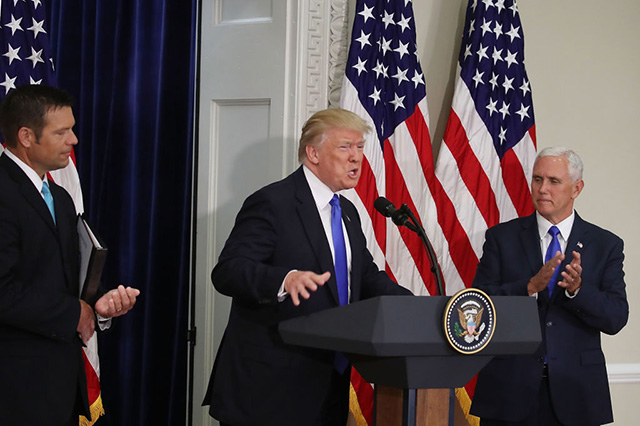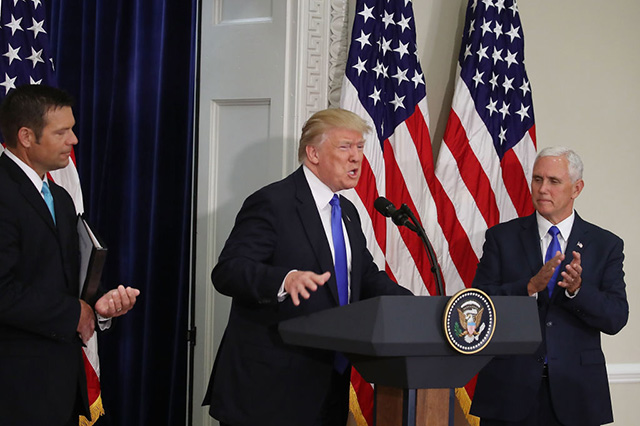
 President Trump speaks while flanked by Kansas Secretary of State Kris Kobach and Vice President Mike Pence during the first meeting of the Presidential Advisory Commission on Election Integrity in the Eisenhower Executive Office Building, on July 19, 2017, in Washington, DC. (Photo: Mark Wilson / Getty Images)
President Trump speaks while flanked by Kansas Secretary of State Kris Kobach and Vice President Mike Pence during the first meeting of the Presidential Advisory Commission on Election Integrity in the Eisenhower Executive Office Building, on July 19, 2017, in Washington, DC. (Photo: Mark Wilson / Getty Images)
The President’s Commission on Election Integrity convened its first meeting on Wednesday in its bid to find rampant voter fraud in our election systems.
Since winning the presidency last November, Trump has repeatedly claimed — without evidence — that millions of people voted illegally in the contest. He made similarly dubious comments on Wednesday, suggesting that states not cooperating with his commission might have nefarious intentions.
As its first official act, the commission sent requests to all 50 states and Washington, DC last month for voter roll information, including individuals’ full names, addresses, voter history, party affiliation, and social security numbers.
Forty-four states and DC rejected the commission’s appeal on grounds that the data request was too intrusive. In some cases, states are legally prohibited from releasing that sort of voter information.
“If any state does not want to share this information, one had to wonder what they’re worried about.” President Trump said on Wednesday, ahead of the commission’s first meeting.
“There’s something,” he went on. “There always is.”
Conversely, various Secretaries of State have made similar charges of Trump’s voter commission. The body is chaired by Vice President Mike Pence, and co-chaired by Kris Kobach, the Kansas Secretary of State.
Kobach has a history of chasing down voter fraud to no avail. But his efforts have been successful in depressing voter turnout. His multi-state crosscheck system — allegedly created to find double-voters — instead wrongfully cast hundreds of thousands of people off voting rolls, according to a report in Rolling Stone by investigative journalist Greg Palast.
It’s that history, which has state officials worried about what the commission is actually up to.
“I will not provide sensitive voter information to a commission that has already inaccurately passed judgment that millions of Californians voted illegally,” California Secretary of State Alex Padilla said in June, responding to the commission’s request for voter information.
Connecticut Secretary of State Denise Merrill echoed those sentiments, saying earlier this month: “Given Secretary Kobach’s history we find it very difficult to have confidence in the work of this Commission.”
Kobach appeared on CNN Wednesday, claiming his commission is interested in just the facts. “The commission is not set up to prove or disprove President Trump’s claim,” he said. “This commission is going to be looking at real figures, real numbers, real voter rolls and real cases.”
This is hardly a novel idea, however, as several researchers have devoted considerable time to quantifying voter fraud in the US.
One study out of Loyola, for example, looked at US elections between 2000 and 2014, and found only 31 instances of voter fraud out of more than 1 billion ballots cast.
Join us in defending the truth before it’s too late
The future of independent journalism is uncertain, and the consequences of losing it are too grave to ignore. We have hours left to raise the $12,0000 still needed to ensure Truthout remains safe, strong, and free. Every dollar raised goes directly toward the costs of producing news you can trust.
Please give what you can — because by supporting us with a tax-deductible donation, you’re not just preserving a source of news, you’re helping to safeguard what’s left of our democracy.